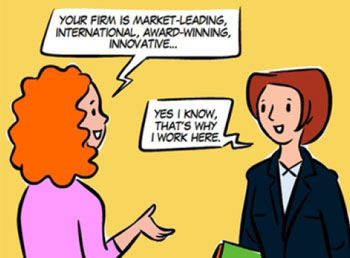Common sense about law applications
Thanks to Ben Staveley for sharing his advice on training contract applications with our students. As you’ll see, Ben was a partner at Freshfields for 15 years and had a hand in recruitment. I encourage all of you to print his guide off, read it a few times, highlight it and have it by your side when writing your vacation scheme or training contract applications; it’s the best guide I’ve seen on the application process.
I came into contact with Ben after reading his book, Faultless Grammar: The busy lawyer’s reminder guide. I’d thoroughly recommend it to any of you looking to improve your writing.
Finally, you can check out our 2018 training contract application guide here.
[divider height=”30″ style=”default” line=”default” themecolor=”1″]
A Guide by Ben Staveley
[divider height=”30″ style=”default” line=”default” themecolor=”1″]
Let me tell you why I’ve written this, and why you might want to read it.
For over twenty years, I worked in the same law firm. It became, no thanks to me, one of the most successful law firms in the world. When I was a partner there, I was asked to join the group of partners that interviewed students who had applied for training contracts. So, to prepare for the interviews, I read lots of applications.
Later, I got even more closely involved in how the firm recruited its trainees. I became not just an interviewer, but someone who decided who should be invited to interview. To do that, I had to read all the applications the firm received, good and bad, and sort them into two piles.
The ‘no-to-interview’ pile was taller than the ‘yes-to-interview’ pile. That’s not because we liked turning people down without interviewing them. But if we’d tried to interview everyone who applied, we wouldn’t have had any time left over to advise the firm’s clients. We had to draw a line somewhere.
We used to worry sometimes about whether we were turning down, without inviting them to interview, some very talented people. If we had, we’d have been harming the firm. We’d have missed out on recruiting someone who could have been a real asset to the firm. Of course, we could never tell whether we had missed out. These possibly-talented people were the ones we had turned down. So we never saw them.
Our worrying, in other words, never led anywhere productive. In the end, we just had to get on with reading the applications as carefully as we could, to give ourselves the best chance of interviewing the right people.
I have left the firm now, but I would guess that not very much has changed. And that what that firm does is what most firms do.
If you are making any sort of application to a law firm, you want your application to end up in the ‘yes’ pile. If you read on, I’ll tell you what to do to give yourself the best chance of doing that. I’ve written it in the form of some questions you might have about the application process, with my answers.
It doesn’t matter what you are applying for – a training contract, vacation placement or a place on an open day. I’ve written about what I know best: applying to a solicitors’ firm. But you may find some of it relevant if you’re planning on applying for the bar, or even if you’re applying for something outside the law.
I hope you find this short guide helpful in supplementing the excellent advice already. It all works, it’s then over to you to do well at the interview. That’s another story.
Who’s going to read my training contract application?
Students don’t tend to spend any time worrying about this question. There’s no way of answering it for certain, of course. But that doesn’t make the question a pointless one. Whenever you write anything at all, the question ‘who’s my reader?’ is a crucial one. When you write a text to a friend, you have a picture of her in your mind. You put yourself in her shoes. You don’t tell her things she knows already. But you fill her in on things she doesn’t. This isn’t a conscious process – it happens automatically. But if you don’t have a reader in mind, you’ll find it harder to write well.
In what follows, I’m going to have a reader in mind. It will help if we give the reader a name – let’s go for Alex.
But I’ve no idea who Alex is
No, that’s right. But you know something about Alex, don’t you? You know which firm she’s from, for a start. (Actually, you don’t know whether Alex is a he or a she. I’m going to assume Alex is a she, but nothing turns on this.)
Going back to Alex’s firm – you’ve read a bit about what the firm is like: how big it is; whether it’s based in London or somewhere else; whether it likes to present itself as a cool newcomer or an established firm with a long pedigree.
You may have met someone from the firm at some recruitment event or other: maybe even Alex herself. And even if it wasn’t Alex, what the someone said to you about the firm was likely to be “on-message”. Firms don’t tend to send mavericks to recruitment events.
But can I even tell whether Alex is a partner or someone in Human Resources?
No, you can’t know for certain – unless you’ve met her. But it would be a bit of a surprise if it were a partner who was the first to read your form. In most firms, the task of form-sifting is delegated by the partners to someone in HR, even if the partners still do the interviewing of the candidates Alex selects. It’s the person in HR you’ve got to impress first – otherwise you won’t get to meet the partners at interview.
If Alex is indeed in HR, that’s no bad thing. Because she reads so many forms, Alex is likely to be fair-minded. She’s trained herself to read your form fairly, and won’t let prejudices or preconceptions get in the way of awarding the interview slots she has available to the candidates who write the best applications.
[one_second]
But I still don’t really know very much about Alex, do I?
Well, you’ve made a start. And though you may not know much about Alex personally, you can, or should, have a sense about what her day is like. On the day she reads your application, she’s not just going to be reading yours. She’s going to be reading twenty. And she knows that of those twenty applications, she would normally have room to offer, say, five interviews. That’s not an iron law. If the twenty forms she reads on Tuesday are a better than average batch, she might offer eight interviews. If Friday’s twenty are worse, two. But Alex is only human. She knows that the partners who do the interviewing will hold her to account. They don’t like spending time interviewing wholly unsuitable candidates. So she will want to be convinced in the first place that you’re not one of those.
[/one_second]
[one_second]
What does that mean, ‘totally unsuitable’? How can I be ‘totally unsuitable’?
Well, for a start, you’ll be totally unsuitable if you don’t really want to join Alex’s firm. If it’s an international commercial firm but you have no real interest in business, for instance. Or it’s an immigration law firm and you have no real interest in individual human rights. This is a time to be honest with yourself. Do I really want this job? Will I enjoy doing it? Any legal job is going to involve a lot of dedication and hard work. If what Alex’s firm does doesn’t truly excite you, why should you think that you’ll be able to commit yourself to the sustained effort you’ll need to get on? Feigned enthusiasm is no good to anyone. It probably won’t fool Alex, who is trained to spot it. If it fools her, you won’t get past the partners who interview you. And if you do, you’ll end up miserable in your ‘chosen’ career. Not very enticing, is it?
[/one_second]
All right. But I might just be applying for an open day or similar event to see what I think. I don’t know whether I might like it or not yet. Do I have to pretend to be more interested than I am, or might end up being?
No. Be honest. Alex respects honesty. And her antennae are highly attuned to detect its opposite. If you’ve no legal experience yet, but want to visit a firm to find out what it’s like, that’s fine. Alex is sympathetic to the Catch-22 that would prevent someone getting a first taste of the law on the grounds that they’d never tasted it before. If that’s where you are, say so. Alex will want to know why you think you might be interested – make sure you explain this.
Also, if you’re coming to think about a legal career a bit later than some, explain why. Perhaps you weren’t convinced until now, and saw yourself doing something else, but have changed your mind. That’s all right. People are allowed to change their minds. People who are straightforward about themselves are attractive. But keep in mind always that Alex will be asking herself questions about you as she reads your application. Try to anticipate those questions, and answer them.

I get the picture. But how do I make myself stand out? What will Alex be looking for?
If the firm has its own application form, you can tell a lot about what Alex will be looking for from the form itself – the questions it asks you. Although most firms look for broadly similar characteristics, each firm asks you slightly different questions when you apply.
Why is that? It’s not done to irritate you, though that may be a powerful secondary effect. The reason is that each firm takes recruitment seriously, and has a slightly different view of what qualities are the most important. So look at the questions very carefully – they give you the best insight into what characteristics or qualities the firm puts at the top of its list.
You can also learn a lot from the firm’s own website, particularly what the firm says about its recruitment process. The website may say explicitly what characteristics it is looking for in those it recruits. If so, you can bet that Alex will be looking to see whether you can convince her that you have those qualities already, or can develop them. The form will be carefully designed to let her reach a judgement on that.

OK – I get that. But you said that ‘most firms will be looking for broadly similar characteristics’ – what are they, then?
At the broadest level, most firms are looking for applicants to have three characteristics.
First, you’ll have to be bright enough to do the job. A lawyer’s job is to deal with clients’ problems. You have to be able to analyse those problems, work out how the law affects them, and suggest solutions. That isn’t straightforward. It’s beyond the clients themselves, which is why they’re paying you to give them advice.
Secondly, you’ll need determination, character and stamina. Law isn’t an easy option: clients are demanding, and firms compete with one another for work. Their business success depends on impressing clients, so firms want everyone working for them to be willing to do as much as it takes to put the job first and get it done. You can expect long hours, often unpredictable. You will need a determination to do the very best job you can, however adverse the circumstances.
Thirdly, human qualities: your job will need you to get on well with clients and colleagues. You’ll need to be able to empathise with the clients’ problems and win their trust. You need a strong ethical sense to help your clients make tricky judgements (and you’ll come across some tricky judgement calls of your own). And you need to be a supportive colleague, happy to help others in the firm who are in need of a hand.
But what about ‘commercial awareness’? Why isn’t that on your list?
It’s true that many firms – principally firms advising business clients, of course – make a point of saying that they look for commercial awareness among their recruits. This leads students, eager to develop this elusive quality, to spend hours trawling the media for business news, an effort that probably spikes in the night before an interview.
I am sceptical that this is enough to fool many interviewers. If you are genuinely interested in the business news, good luck to you. You’re probably rather an unusual student. If you’re not, you might be better thinking about some more basic questions: if this firm advises business clients on their problems, why am I interested in shaping a career around doing that? What is it about the business world that might be of interest?
If you do want to read something about ‘commercial awareness’, try a book called ‘Commercial Awareness 2015/16’, written by Chris Stoakes. Declaring an interest because he is an old friend and ex-colleague of mine, I can tell you that it is excellent.
Once I’ve identified what qualities Alex is looking for, how do I convince her I have them?
Sometimes, the application form itself will help you. Let’s say that Alex’s firm is particularly interested in tenacity. The form may give you a framework. It may say explicitly: ‘Write in no more than 250 words about a time when you have had to display tenacity in meeting a challenge.’
But sometimes forms don’t give you that hint. My old firm for example asked for a more general personal statement. But don’t let that lull you into thinking that Alex isn’t interested in the qualities you will need. She’s just looking to see if you can convince her that you have the X factor without flagging up her interest in the form of a direct question about it.
What about saying explicitly ‘I am a tenacious person’. Is that what Alex wants? It shows I’ve picked up what they are looking for
Well, yes. But it doesn’t really help that much. Alex is looking for a bit more than that. It’s a bit easy simply to identify a quality and say that you have it. Everyone can say that, and nobody says the contrary. Alex doesn’t often read ‘I am aware that the firm is looking for tenacious people. However, I tend to crumble at the first hint of adversity, and my friends say I never see anything through.’

What Alex wants is evidence. She’s going to understand that, if you took on some role in a failing student society and ended up doubling its membership, you may have had to stick at things. Tell her about it. You don’t even need to say ‘and this demonstrated that I am a tenacious person’ – Alex will get the point.
But don’t I need to be up front about my achievements? Don’t I need to do this to stand out
You have to reach your own judgement as to how assertively you want to come across. Remember, though, that Alex will mistrust things you write that she sees as just puffing yourself up.
Don’t, for example, say that you’re ‘passionate’ about one of your subjects if what you really meant that at least you found it more interesting than something really boring you were studying at the same time. Don’t say that your fluency in French will make you an ‘invaluable asset’ to the firm’s French practice. No, it won’t. The firm will have a host of fluent French speakers who are experienced lawyers. Alex will simply think that you come across as unrealistic, or immodest, or both.
To show I’ve read the website, should I refer to some of the firm’s awards or deals that appear there?
No. Alex just cringes when she reads that. She’s not reading the form to find out about the firm she works for, which she knows far more about than you do. Amazingly enough, Alex wants to find out about you. Don’t waste space telling the firm about itself. Alex will feel she’s working in an echo chamber.

It’s much better to show more subtly that you’ve done your homework by mentioning characteristics about the firm that are relevant to why you’re applying to it. For example, if you are particularly interested in some areas of law that the firm practices in, why not write about that?
How much should I write?
This is sometimes a really easy question, because the firm tells you what it wants. It gives you a word limit. If there’s a word limit, that’s a maximum. Don’t exceed it. If you’re in a Word document, use the ‘word count’ tool under ‘review’ to check how many words you’ve got. If it’s longer than the word limit, cut it down. Alex will notice it if you exceed it.
Even if you haven’t got a word limit, remember how busy Alex’s day is. She will be grateful if you are concise. If you become a practising lawyer, you will have to become expert at conveying advice succinctly. Alex will react favourably if you show that you can already do this when writing about yourself.
Edit your application to see how much you can pare it down without losing any of the meaning. You may be surprised at how much you can cut out.
So I can’t just send in my CV with a covering letter?
Well, some firms may be happy with this for some positions or events. For example, they may be happy to let you apply for an open day through a CV, whilst still asking applicants for training contracts to complete a bespoke form. Whatever the firm asks you to do, do it. A lawyer needs to be careful and meticulous, and a law firm expects you to be careful and precise in the way you go about applying to become one.
If you do submit an application in the form of a CV plus a covering letter, don’t simply repeat something from your CV in the letter. Alex will resent you making her read the same thing twice. If there is some point from your CV that you want to refer to in your covering letter, fine: but if you do that, acknowledge that you are doing so (‘as you will see from my CV, I have spent time working in an IT support role’) and avoid repeating unnecessary detail.
Don’t cut and paste bits from your CV into a covering letter. Your CV will often be written in a staccato style, rather than in the full sentences you should use for a letter.
Any tips on CVs?
There is lots of good advice available from the university’s Career Destinations site about how to put together a CV. So I’m just going to say a little bit about what Alex thinks about CVs.
With a CV, Alex’s main concern is Don’t Waste My Time.
When Alex gets a CV and covering letter, you can’t tell what she’ll read first. What I used to do was glance at the CV first, before reading the covering letter. Alex may well do the same. If so, she’ll not spend very long at all – maybe less than half a minute – looking at it. What she’s trying to do is to download from it all the most important facts about you before she reads your covering letter.
That makes the CV important. If Alex thinks that your CV is poorly-constructed, she might not get as far as reading your covering letter. And even if she does, she’s already thinking: this applicant probably isn’t for us.
So you need to concentrate on getting the information across to Alex as quickly and painlessly as you can. Make every word count.
Give me three ‘dos and don’ts’ that I can keep in mind when I make an application
All right. Some of what comes next follows from what I’ve already said.
Do:
- Explain – ideally right up front – why you think you might want to follow a career in law, and with that firm in particular (or a firm like it if you are not applying for a long-term position but a placement). You are not trying to flatter Alex, but to get her to understand that you’ve made a considered decision in applying to her firm
- Write realistically and straightforwardly about yourself. Self-knowledge is an attractive asset. Draw attention to what you think you are strongest at, but don’t be afraid to acknowledge that you are not perfect. Alex has yet to meet a perfect applicant
- Mention any experience you have that may be relevant. Sometimes applicants assume that Alex won’t be interested in, for example, work experience outside the law in the form of a weekend or holiday job. But she will be: it will show her that you’ve experience of turning up and applying yourself in an environment you might not have chosen if you hadn’t needed to earn some money.

And don’t:
- Assert you have qualities without giving Alex some evidence that she can use to corroborate what you say about yourself
- Write in clichés. Alex sighs when she reads that you are ‘passionate’ about law, ‘relish challenges’ and spend your time ‘honing your transferable skills’. In the law, you will need to use language carefully and thoughtfully. If you use stale, third-hand expressions when you are writing about yourself, Alex won’t be convinced you will ever be able to
- Make mistakes in your spelling and grammar. A lawyer’s professional responsibilities involve meticulous checking of detail. Alex finds it staggering that you could imagine she will take your application seriously if you don’t take the trouble to make sure it is completely error-free.
[divider height=”30″ style=”default” line=”default” themecolor=”1″]
Some examples of what to write and what to avoid
“My name is Sean McDonald and I am a second year student at the University of Southampton studying law.”
[idea]Comment: think of Alex. Will she already have gathered this information from something you’ve already written? If so, leave it out.[/idea]
“It would be an honour to indeed join the esteemed firm of Pyne Martin. You are recognised by Chambers as among the top three firms representing local authorities for contract outsourcing work and hospital trusts for medical negligence.”
[idea]Comment: Alex is immune to the flattery, and is unimpressed.[/idea]
“I chose to study the law of medical negligence as an optional module in my second year, and came across the issues that arise for local authorities in outsourcing when I worked for Waveney DC in the summer before I came to Southampton. So I was interested to reads about Pyne Martin’s strong reputation in both these areas.”
[idea]Comment: much better. Alex knows that you have read the website, and sees why the practice areas may be of interest to you.[/idea]
“My parents always told me that I should become a lawyer because I was always getting the better of arguments with my brother and sister.”

[idea]Comment: a bit strained. Surely your thinking has developed since then? The terms that may spring to Alex’s mind include ‘shallow’, ‘conceited’ and ‘confrontational’.[/idea]
“In my second year, I have been intrigued to study a module on environmental law, which has opened my eyes to the impact that the rule of law has on the world we live in and how legal issues permeate every aspect of the lives of a country, including the state, businesses and citizens, all of who have different and sometimes conflicting interests which the law must constantly seek to accommodate and reconcile in a manner that takes account of the future as well as the present.”
[idea]Comment: too long. 87 words: you need to edit it. Burdened with cliché, and with metaphor that betray a lack of thought (how can anything ‘permeate’ an ‘aspect’?). Oh, and ‘all of who’ is ungrammatical – it should be ‘all of whom’. Try instead: ‘I have recently enjoyed studying environmental law, which exemplifies how law is far-reaching and must seek to reconcile the different interests of those it affects’ (25 words).[/idea]

[info_box title=”” image=”” animate=””]We wish you the best of luck in your training contract applications. If you’re still struggling and would like some guidance, you can send us a final draft of your application for a review here. Or, if you have any questions, head over to The Academy and we’d be happy to help. [/info_box]


